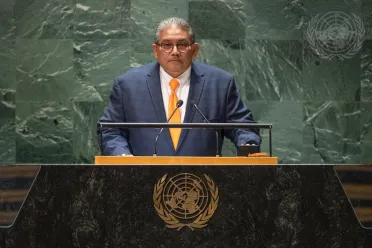Statement
Statement summary
DATO ERYWAN PEHIN YUSOF, Second Minister for Foreign Affairs of Brunei Darussalam, said that in July, his Government presented its second voluntary national review report, which shows it is on track across several SDGs and in line with its National Vision: Wawasan Brunei 2035. This plan aims to create a dynamic and sustainable economy with a high quality of life for all citizens, even as the country grapples with a lack of reliable data, which hinders accurate monitoring and evaluation of its progress towards achieving the SDGs. To meet this challenge, his Government is working with ASEAN, which recently launched the ASEAN Centre for Climate Change in Brunei Darussalam. The Centre will help collect data concerning the challenges of climate action and serve as a regional hub and research facility to enhance countries’ capacity to mitigate and combat climate change, he said.
As a new global order emerges in a multipolar world, small States like Brunei Darussalam recognize the United Nations important role in maintaining international peace and security through a rules-based order, he said. The Government upholds the principles the Organization was founded upon nearly eight decades ago: sovereign equality, territorial integrity and the political independence of all States. “Brunei Darussalam is ready to forge a new global consensus that preserves these values while addressing emerging issues and resolving existing challenges,” he said. In an increasingly interconnected modern world, trust and solidarity can only be achieved with tolerance and respect. He expressed dismay about the increased acts of intolerance and disrespect, particularly acts of religious hatred, directed at the Islamic faith. These deliberate actions, such as the burning of the holy Qur’an, provoke disharmony and undermine efforts for a sustainable peace. He called for increased action against religious hatred, especially Islamophobia and anti-Islam sentiments.
Turning to the State of Palestine, he said the situation there is an example of the international community’s collective failure as the Palestinian people have been denied their fundamental freedoms safeguarded under the Charter. The seventieth-fifth anniversary of the Nakba earlier this year showed how the Palestinian people have been deprived of their rights to self-rule and peace. “We stand firmly in solidarity with them, to truly ensure that ‘no one is left behind’,” he said, urging the United Nations to uphold its commitment to the two-State solution as the viable path towards a comprehensive peace in the Middle East. The world is at a crossroads as it faces humanitarian crises and global mistrust of international institutions and between States. “Therefore, to ensure a better future for generations to come, it is crucial that we refuse to accept actions that divide us or conflicts that oppress us,” he said. “Above all, Mr. President, we must not let mistrust overpower our unity.”
Full statement
Read the full statement, in PDF format.
Photo

Previous sessions
Access the statements from previous sessions.
